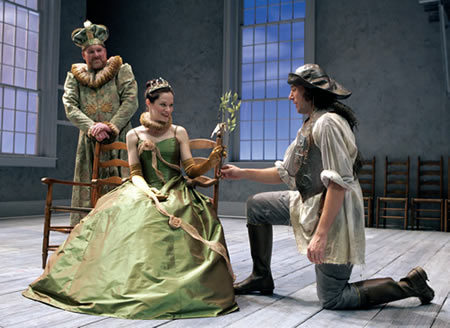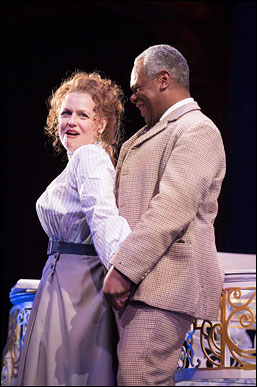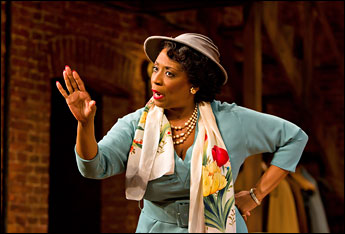|
JACQUELINE LAWTON: Why did you decide to get into theatre? Was there someone or a particular show that inspired you?
JAYNE BLANCHARD: I have been going to the theater as long as I can remember. My mother took my sister and I to a children’s theater at the Baltimore Museum of Art and I guess I must have been around 3 when we saw the first play, Androcles and the Lion. I loved it so much I insisted my mother take me up to meet the actors and when I shook the Lion’s velvety paw, that was it. I was hooked. My parents also used to take us to New York on the train to see musicals and I remember seeing Gypsy, Promises Promises, and You’re a Good Man, Charlie Brown when I was little. My parents had recordings of every Broadway show, it seems, and we would listen to the records in the living room as a family. JL: How long have you lived and worked as a theatre critic in D.C.? What brought you here? Why have you stayed? JB: I have been a theater critic here for 14 years—hard to believe! I am a hometown Baltimore girl and in the 80s and early 90s lived in DC and worked as a movie critic and culture writer. I returned to the area in 1999 and found work at the Washington Times as a theater critic. This place is my home. I have so enjoyed watching the theater scene here grow and grow up. The Baltimore-Washington area as a theater destination seems to have come into its own. JL: How do you define the work you do? Specifically, what is the role of the theatre critic in the world of theatre? What contribution do you hope to make in the D.C. Theatre community and the American Theatre? JB: I approach the job as critic in many ways. First as a reporter, who is giving the reader a taste of what it was like to see a particular show at a particular point in time. Many readers experience theater through reviews and if you can give a sense of what it was like to be there and see, hear and feel what will never be repeated again, I think you have fulfilled some of what theater criticism entails. Next, a review should closely examine the play and the production. Does it succeed within its genre—which can be as simple as saying it is funny (and why) if it is supposed to be a comedy. How does it hold up structurally? Do all of the different parts work, either individually or as a whole? Is it a good story? Do the characters draw you in? Do you learn anything from the production or does it expand your perspective in any way or reinforce what you already know? Has the show changed you in any way? I see criticism as asking yourself a series of probing questions and answering them to the best of your ability. My contribution to the DC Theatre Community would be one of support and also giving people a sense of what it was like to experience a production. I also think it is important to contribute a woman’s voice, since there are not that many of us out there. JL: If your work as a theatre critic doesn’t pay the bills, what else do you do? How do you balance this work with your play viewing and criticism? JB: I supported myself as a critic, arts/culture writer and freelance writer and editor since I was 21 years old, but the newspaper, magazine and publishing industry has changed so much I couldn’t do it anymore. About 6 years ago, I became a writer and editor for Johns Hopkins University and now I work for a health care company writing and editing. I wish I could be immersed in the world of the arts all the time, but the sad truth is that I can’t afford it. But in a way, working full time makes me more like the typical audience member who may be tired, stressed and preoccupied before the curtain goes up and may just want to escape for a few hours into another world. JL: What skills and traits do you feel a successful theatre critic should have when writing about theatre, especially when it comes to new plays? JB: For new work, it helps to be open and open-minded. You don’t want to come in with pre-conceived notions, if you can help it. I think reading the play first helps if you can get a hold of the script. The danger with that is that you may have formed ideas about how the play should be staged or what it looks like in your mind, but you can try to push those thoughts out of your head when actually seeing the play. To me, it really helps to read the play first and get some sense of the characters and the plot so you are not sitting there thinking “Who is Sid again?” and “We’re in Prague, right?” and not concentrating on what is happening in front of you. JL: What is your writing and viewing process? Do you read the script prior to seeing a production? Do you research the author and/or world of the play? Do you read the program notes? JB: It varies, depending on how much time I have. At the very least, I read the program notes and see if there are articles (not reviews) on the play, author and/or production beforehand on the Internet I can look over. Sometimes, I reread plays I am familiar with, particularly if it is something I have a vague recollection of and/or I have a memory of it that may be unreliable. For instance, I reread one of my favorite books, The Portrait of Dorian Grey, before the production at Round House because I wanted to re-acquaint myself with Wilde’s purple prose. And man, it is Gothic and over-the-top and I guess I didn’t remember it as that purplish when I read it as an angst-y teenager. But the production’s excesses were pitch-perfect to Wilde’s prose—audiences and critics may not have liked it (I thought it was fabulous), but it was spot-on! JL: In the article, “Ohio Critic's Tough Words Elicit Rough Reaction,” Denver Post Theater Critic John Moore states: “There is no universal rule book for criticism, no how-to manual. My guidelines: Be true to your visceral emotional response, good or bad. State your case and back it up. Be a catalyst for discussion. Encourage dialogue. Don't be personal. Never try to be funny at the expense of someone's feelings.” What guidelines, rules or standards do you have for your own work? Have you always upheld them? If so, at what cost? If not, what shifted the line for you? JB: I agree about being true to your instincts and visceral emotional response, good or bad. If you can’t trust your instincts and response, what can you trust? And also you need to acknowledge the lack of an emotional response—to me, theater is supposed to move you, make you feel something, re-arrange your nerve endings, make you see something through new eyes, feel it through new skin. If it doesn’t, you saw something but it wasn’t theater. I also believe that theater criticism should be lead to a larger discussion whenever possible. It isn’t the be-all and end-all. Reviews are part of the theater experience for many people. In my reviews, I try to uphold the journalistic standards that have been drilled into me since college: Tell the truth. Get the facts right. Check your sources. Be tough but fair. Don’t be on the take. Disclose your biases upfront. Use the 5Ws and 1H to craft your reviews. Remember that theater people are not friends you want to impress so you will be considered popular—they are part of a beat you cover. I try to maintain these at all times. Maybe I am fuddy-duddyish to approach theater criticism from a newshound or reporter perspective, but that’s the way I was trained. Too late to go back now. JL: What is the greatest part of being a theatre critic? What has been your most difficult challenge? JB: The greatest part is when the curtain goes up and you wonder what is going to happen. It is like turning the knob on a hotel room and not knowing what is there—that mystery, that anticipation. Also, it is a privilege to be a part of the theater scene—to be a member of the audience seeing all these wonderful productions and actors. The most difficult challenge can be energy and motivation. I drive from Baltimore and sometimes it takes forever to get to DC and then forever to drive home and I wonder exactly why I am killing myself for theater. It is also a challenge to gear myself up for long shows—perhaps that makes me hopelessly bourgeois but the prospect of a 4-hour production does not make my socks roll up and down. However, when a show is extraordinary, like August Osage County or the three-act Who’s Afraid of Virginia Woolf? or Peter Brooks’ The Mahabarata, the time flies by like a song. I admit I sometimes find it difficult to rise from the couch to see a play or musical for the gazillionth time. I really am “Romeo and Juliet-ed” and “Les Miserables-ed” out—although I am willing to be surprised. JL: Who are your favorite playwrights? What is it about their work that inspires or draws you to them? JB: I love Harold Pinter, Tom Stoppard, Edward Albee, August Wilson, Caryl Churchill, Naomi Wallace, Suzan Lori-Parks, Stephen Sondheim, Tennessee Williams, Tony Kushner, Arthur Miller, Wendy Wasserstein, Sarah Ruhl, Lynn Nottage, Mary Zimmerman, Bryony Lavery, Michael Hollinger, and all the Jacobean tragedians—love Jacobean tragedy. It is my guilty pleasure. I am sure there are more playwrights, but I can’t think of them all right now. JL: DC artistic directors … JB: Michael Kahn, Kwame Kwei-Armah, Howard Shalwitz, David Muse, Eric Schaeffer and I am totally a fan of the Baltimore Rock Opera Society. JL: DC actors, designers and directors are .. JB: Radiantly talented! John Vreeke, Rebecca Taichman, Michael Kahn, Tony Cisek, Bobby Smith, Nancy Robinette, Jennifer Mendenhall, Will Gartshore, Jenna Sokolowski, Susan Lynskey, Debra Hazlett, Helen Hedman, James Flannigan, Sherri Edelen, Ted van Greithuysen, Floyd King, Frances Jessica Dukes, Erika Rose, Tim Getman, Marty Lodge, Laurence O’Dwyer, E Faye Butler, Thomas Jefferson Byrd JL: DC playwrights are… JB: Promising and out there working away and getting produced, which is great. My all-time fave DC writer is Joan Cushing—an excellent command of story and character. But I also admire Harry Bagdasian, Psalmayne 24, Renee Calarco and John Strand. JL: DC audiences are ... JB: Intelligent and responsive. They can’t stay away from their gizmos however—they tend to check their phones, ipads and tablets constantly during shows and texting if they get bored. Don’t they realize how rude that is, to both the audience and the actors? JL: How do you feel the DC theatre community has addressed the issues of race and gender parity? How has this particular issue impacted you and your work? JB: I still think it’s weird that DC doesn’t have a major African American theater company that has been around for decades. I mean for Pete’s sake, there are two in the Twin Cities in MINNESOTA--Penumbra in St. Paul and Mixed Blood in Minneapolis. And we still have a tendency to cram black theater into Black History Month and feel like we’ve done our job. Gender is harder because it is so ingrained. We definitely need more women directors, artistic directors, dramaturgs, etc. And playwrights—I am always shocked when a male critic disparages women playwrights such as Wendy Wasserstein with a total lack of respect for what she achieved and her contribution to American theater. Such blithe hatred and disrespect for her and other women playwrights—it takes my breath away. But then, as I said it is so ingrained. I was looking up the spelling of a woman playwright’s name and came across an alphabetized list (510 entries) of famous women playwrights through history. It was alphabetized—by first name. Yep, Aphra Behn was in the “As” and Suzan-Lori Parks was found with all the other Susies and Susan’s in the “Ss.” Are you kidding me? Can you imagine a list of male playwrights by the diminutive first name—Chekhov under “A” for “Anton” and Shakespeare with all the Wills and Wilfreds? JL: What advice do you have for an up and coming DC based theatre critic who has just moved to the area? JB: See everything you can, read everything you can and keep at it. Above all, be honest and true to yourself and what you feel.
2 Comments
DAVID M. PETROU
6/7/2013 04:37:41 pm
Jayne Blanchard has been a very real part of the joy and wit and intelligence of the burgeoning Washington-Baltimore theatre scene for nearly two decades. Above all, she understands completely that the role of a critic is to "critique" a play, not simply to "criticize." I'm afraid too may theatre and especially film critics are more interested in dazzling their readers with a well-turned phrase or an acerbic comment that may wound but in their mind, will be remembered. Jayne has an open mind; a keen intellect and a big heart. And she has greatly helped the local theatre scene become bigger, broader and far more engaging than it ever was. Kudos to this wise and witty woman of the theatre!
Reply
1/16/2017 05:21:07 pm
I have happy memories of Jayne and her wonderful work at the journal newspapers in the 1980s in dc, and of the night she walked into an open manhole on her way home from a late movie preview.
Reply
Your comment will be posted after it is approved.
Leave a Reply. |
My BlogI'm a playwright, dramaturg, and teaching artist. It is here where you'll find my queries and musings on life, theater and the world. My posts advocate for diversity, inclusion, and equity in the American Theatre and updates on my own work. Please enjoy!
Categories
All
Archives
June 2020
Reading List
|



